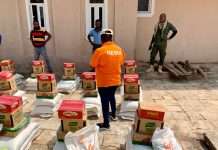Following the proliferation of illegal medicine stores arising from the temporary inability of officials of the Pharmacists Council of Nigeria (PCN) to conduct routine national enforcement during the COVID-19 lockdown, the Council says it has renewed and intensified its operations to close all illegal medicine stores and unregistered pharmacies in the country.
The PCN Registrar, Pharm. Elijah Mohammed, who made the disclosure to Pharmanews in an exclusive interview, lamented the havoc wreaked by unscrupulous businessmen during the lockdown necessitated by the pandemic.
He has however assured Nigerians that the reign of charlatans is over, as the PCN is set to seal any drug store or pharmacy that fails to meet up with its extant laws and regulations.
Mohammed said: “During the lockdown necessitated by the pandemic, PCN could not carry out inspection and enforcement activities due to restriction of movements. Unfortunately, the period was characterised by proliferation of illegal medicine shops across the country.

“However, the PCN engaged with the office of the Inspector General of Police (IGP) and secured official waiver (pass) from the IGP to enable resumption of the enforcement and other regulatory activities of the PCN. So far, the PCN national enforcement activities have resumed and they are being intensified to ensure that such illegal medicine shops are closed down.”
The registrar also revealed that, contrary to the allegation made by some pharmacists that the Council is being insensitive to the plight of pharmacists in sealing their pharmacies for minor offences, most of the sealed premises pharmacies were patent medicine shops which upgraded to pharmacies without meeting the registration requirements.
He stressed that some of the deficiencies observed in these premises actually violate the extant laws and regulations of the Council.
According to him, such violations include: “Absence of a superintendent pharmacist on ground to supervise pharmaceutical activities within the premises; poor storage facilities, use of pharmacy students to stand in for superintendent pharmacists and access of unauthorised staff to the poison cupboards.”
For some premises owned by pharmacists, he said it was discovered that some of them were working in other places while superintending their own premises at the same time, while others refused to display their premises licences or evidence of registration, as required by law.
When asked about the plan of the PCN to close open drug markets in the country, Mohammed said while the implementation of the National Drug Distribution Guidelines (NDDG) is being supervised by the Federal Ministry of Health, there is need for cooperation among stakeholders.
“The regulatory agencies, that is, the PCN and NAFDAC, have their statutory roles which complement one another in the process of the implementation of the NDDG.
“The PCN is discussing and providing necessary support to stakeholders involved and monitoring ongoing activities in the development of their approved sites. We will continue to play our role until the full implementation of the Coordinated Wholesale Centre is achieved. We believe that with government’s support and the cooperation of stakeholders, the challenge posed by these markets will be surmounted in no distant future”, he maintained.
Mohammed further refuted the allegation that the agency was more lenient with patent medicine dealers than pharmacists, saying: “It is not true that PCN is more tolerant in deploying its regulatory activities toward patent medicine dealers than pharmacists. Records of enforcement activities by the PCN in the past five years are very clear on this.”
He described some of the offences that would warrant the closure of a patent medicine shop as follows: “Selling medicines outside the approved list; poor storage facilities; carrying out activities that are beyond their scope of operation, such as clinical services; operating in locations other than the approved location for siting the shop; and setting up PPMV shops, without recourse to the guideline that requires following due process, until the shop is registered”.
He also listed offences that will warrant the closure of a pharmacy to include: “Poor documentation and disposal of poisons and substances of abuse, access of unauthorised staff to the poison cupboard, “Register and Go”, non-display of premises licence or lack of evidence of registration.” He explained that the display of premises certificate helps the public to identify premises that are registered.
Speaking on the impact of the pandemic on the pharmaceutical industry, which has brought about hike in prices of medicines across the country, he emphasised the need for concerted efforts to develop the pharma industry by encouraging research and development in local alternatives whilst also developing the local production of Active Pharmaceutical Ingredients (APIs) which are raw materials that would feed the industries.
He said this measure would go a long way to reduce costs and provide medicine security, as well as employment with improved access to quality, safe and efficacious medicine. He added that the support and provision of an enabling environment by the relevant authorities will also enhance the achievement of the goal in no small measure.












buy tadalafil pills – buy tadalafil online cheap tadalafil 20
Lithuanian Litas
orchid
Functionality
tangible
scalable
deposit
Principal
revolutionize
Ford
Refined
Incredible Granite Keyboard
Programmable